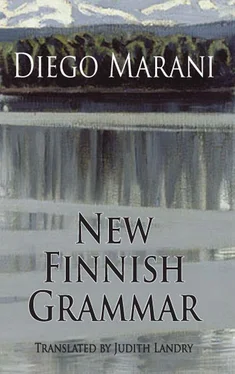Pinned to my seat, I couldn’t take my eyes off the old woman; rocking from side to side, she stared straight back at me, repeating the fateful name under her breath. I could read it on her lips, as they opened and closed, soundlessly, non-stop.
‘Then he would go and have a wash, get on his motorbike and go into town. He bought it with his savings, you know. A German machine, a fine piece of work! That was all he was interested in. Now we’ve sold it to a neighbour. What good is a motorbike to us?’
The old man now appeared holding a steaming teapot, which he put down on the table; the steam wafted through the room, and now there was suddenly a smell of old soup, of cigarettes forgotten on some painted surface.
‘He worked as a lathe operator, did you know? And he’d found a good job — with Abloy, quite near here, the firm which makes locks.’
I picked up my teacup absently and put it down next to the photograph of Sampo Karjalainen which the old man had left lying on the table.
‘But his real passion was for his motorbike; whenever he had a moment he would go down to polish it. On summer evenings he’d take it out to the stretch of grass in front of the building and stay there listening to the engine, looking at the smoke from the exhaust. Then he’d drive off into the blue yonder, and that was the last you’d see of him! Isn’t that right, Leena?’
The old man had sat down on the sofa, next to his wife, holding her steaming teacup, stirring it slowly and helping the old woman to take sips from it, which she did from between half-closed lips; no sooner was her mouth free than she persisted with her endless muttering.
‘Leena’s taking tea with us, aren’t you, Leena? Just like when Sampo was here, making us both laugh. And could he make us laugh, that Sampo! Telling us about his friends in the factory, those two brothers, do you remember?’
The clock on the sideboard ticked on quietly in the silences between his broken sentences; from the courtyard came the sound of an engine backfiring.
‘Only Sampo could make that thing do what he wanted. Isn’t that so, Leena?’
I suddenly felt sick: in need of light, fresh air.
‘I really must be off!’ I exclaimed, pushing the cup away, walking backwards towards the door and turning the handle.
The old man shuffled after me, but did not try to stop me leaving. He blinked behind his spectacles, staring at a gap in the balcony as he spoke.
‘Sampo, please be careful with that motorbike. Don’t drive too fast, and don’t be back late; and don’t drink too much, either, Sampo! It’s dangerous!’
I left without bothering to close the door and rushed down the stairs. On the pavement outside, the red-haired man was doggedly kicking the start pedal of the motorbike; the engine would turn over for a moment, spark briefly into life and then become flooded. A ray of sunlight falling through the main door lit up the dust and violet smoke suspended in mid-air over the pit of the courtyard. I went out with relief into the airy street, into the wan evening sunlight and began to run; I did not stop until I had left the place well behind me, stopping at last amidst the ruins of a bombed-out factory, where I sat down on a low wall, closed my eyes and breathed deeply, until my head began to spin.
At the bottom of this page the address, Teollisuuskatu 456, the date, 23 August 1943, the name of Second Lieutenant Manner, and of the ship, the Riilahti, have been noted down in block capitals, with a line drawn round them. Next to the name of the ship the author had pencilled in the word ‘minelayer’, and a question mark.
At the Admiralty I was told that the minelayer Riilahti had been sunk by the Russians off Tiskeri on 23 August 1943; what remained of it, broken into two, had been located, and is currently lying at a depth of 70 metres. The twenty-four members of the crew all perished; their bodies had been recovered: all except for that of Seaman Sampo Karjalainen, which was still missing. The family had been given a commemorative medal.
The clerk at the Admiralty insisted on showing me a photo of the Riilahti, taken in the summer of 1940 during a naval review. The image of the ship moored at the quayside, with the Finnish flag flying and the sailors massed in the bow, reminded me of the Finnish merchantmen which used to arrive in the port of Hamburg. For me, each one was a piece of Finland. Their arrival had become a regular event, one which gradually came to punctuate the days in my calendar, the changes in season. In spring it was the Pyhä Henrik, which brought timber to Hamburg from Oulu and returned laden with machine tools; in summer it was the oil tanker Pietarsaari and in December the Petsamo, which supplied the ports of Kemi and Pori with grain. Not to mention all the others which called in at Hamburg en route to more distant places. Every evening I would mingle with the sailors when they gathered in the Finnish church, as though they were my family. I wanted to shake hands with each of them, and had to restrain myself from seeming too outgoing, for they themselves were reserved and solitary by nature. My heart lifted when I could render them some service: such simple medical assistance as I could offer made me feel that I was contributing to the well-being of my country, redeeming sins that I had not in fact committed and earning myself some possibility of return. Some ships had been plying the same route for years, and the captains knew me well: we had built up a relationship of mutual trust and respect. After a certain point, without my even having to ask, they would bring me bundles of newspapers. The crews who arrived during the Christmas period never failed to bring me some present or other: some bit of furniture or carpentry tool for the pastor, liquor and cigarettes for me which, although I did not smoke, I kept like so many precious relics. The captain of the Rosvo Roope, which shuttled between Helsinki and Hamburg every three months transporting iron ore, would unfailingly bring me the books I had asked for, together with some magazine or record for my mother. Hearing those Finnish voices in our Hamburg apartment lulled me into the cruel illusion that I was at home, but my mother seemed to be unaffected. She was half-German, but cultivated her Finnish side assiduously. With the help of those records and magazines she kept herself more or less up to date with the latest Finnish fads and fancies — only three months behind. I on the other hand was irritated by that artificial Finland; the music my mother would play incessantly on the gramophone aroused unwelcome memories in me. Yet, when I hear those tunes again today, it is the thought of her that wells up in my mind, and her ‘apartment Finland’ lives on again, as long as the song lasts, in empty rooms.
The Tree of Happy Memories
The letters which follow were copied into the notebook by the author himself. Although some parts are repeated several times, and others are underlined or quoted again elsewhere in the manuscript, it is to be presumed that, in one place or another, the letters appear here in their entirety. Despite having authorized me to publish them, Miss Ilma Koivisto, who wrote these letters, made it known that I should not reread the originals and asked to be allowed to keep them. I am respecting her request, and I thank her for her help in elucidating certain passages whose meaning was unclear to me, clarifying personal references and allusions which an outsider would not have been able to understand. I do not propose to dwell on Miss Koivisto’s feelings, but I must say that I was moved by the evident passion and sincerity which her words convey. If the author of this document had abandoned his pointless search for his past, and yielded rather to the pleasures of the present, perhaps his fate would have been different. Sometimes human thought gets lost in the warren of its own logic, becomes a slave to a geometry which is an end in itself, whose aim is no longer the understanding of reality, but the bolstering of some prior assumption. We are such monstrous egoists that we would rather destroy ourselves pursuing false truths than admit that we are on the wrong track. To shore themselves up against this mental aberration, many take refuge in faith in some supreme being who holds the key to all mysteries and the antidote to all suffering. In exchange for humility, God promises us knowledge, countering our painful multiplicity with his own soothing unity. But, if God existed, He would have made us in a different mould, either total prisoners of the matter from which he forged us, or else completely unshackled by thraldom to our minds: either his equals or his slaves. He would not have abandoned his creatures in this condition mid-way between damnation and beatitude, obliged to pursue divine perfection with the imperfect instruments of human knowledge. If God has need of our imperfections, of our limitations, then He is no better than we are. He is not God, but a demon, and all things proceed from His essential wickedness. In these times, it is true, it is easier to believe in a demon rather than in God. I, who have looked into the eyes of dying soldiers and glimpsed the world beyond, have seen nothing but pitch darkness. So, rather than imagining myself at the mercy of some spirit of evil, I prefer to believe that the universe is driven not by some all-powerful will, but by the random play of chemistry. The thousand substances of which it is composed clash and mingle each time they meet, and their reactions may be as measureless as a stellar explosion or as minuscule as electrolysis; as mighty as the splitting of the atom or as sublime as the flowering of a cherry tree. When everything has finally mixed and merged, when oxidoreduction is complete, when matter is made of nuclei as small as grains of sand but as heavy as this planet, and each electron is set upon its fatal course, then there will be peace in the universe. Peace and death.
Читать дальше












